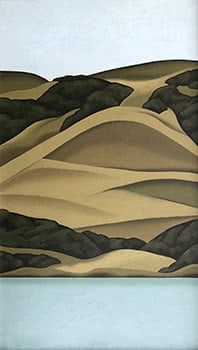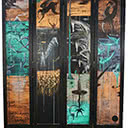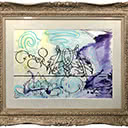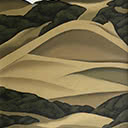Porirua Landscape
75 x 41 cm
est. $200,000 - 300,000
PROVENANCE
Private Collection, Auckland Purchased from Peter McLeavey
Porirua Landscape was painted during the time Robin White was an art teacher at Mana College. This was an important and formative period in her career. She was an Elam graduate in her early 20s: a student of Colin McCahon who did not identify specifically as a landscape painter.
During this period of teaching and working in Porirua, White was part of a creative community living in Paremata known as Bottle Creek, and developed a strong painterly instinct for the region. Her work from this period has a sense of fortitude and authority in its portrayal of the land, and includes a number of her famous hard-edged portraits of houses and shops.
Conscious of her growing influence and reputation as an artist, White wanted to investigate more accessible, affordable forms of art. In the same year she painted this portrait of Porirua, she also began producing screenprints - a medium which emphasised her conscientious approach to both her subject matter (the land) and her viewers.
The process of printmaking would have heightened White's awareness of the relationship between artist and medium, particularly as it was being mediated through the reproduced print. Knowing this, the connection between White as artist/observer, and the cross-section of Porirua land she has captured in this rare example of an oil painting from the time, is even more intimate and treasured.
The view in Porirua Landscape is precise in its narrowness. White slices vertically through the land to eliminate any evidence of habitation or urban development. The delicate detail of lines and light rise upwards from a strip of calm, blue harbour to the hills. This painting is not heavy-handed in conveying White's celebrated crisp, hard-edged style. Rather, it speaks to the humbleness of her approach to the land as a pacifist and a bystander, and denotes the spirit of New Zealand land and regionalism as a whole.





